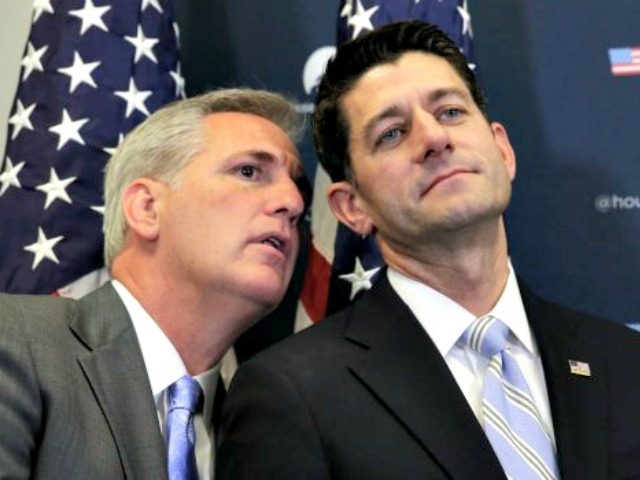Two more GOP legislators signed the amnesty discharge-petition on Thursday, while GOP legislators promised to develop a compromise immigration package by June 7.
June 7 is an important deadline because that is the last day for the authors of the discharge-petition to get their planned amnesty debate on the House calendar for a June 25 debate. If they missed the June 7 deadline, the next day open for the amnesty debate is July 23, just before the August recess.
New York’s Reps. Tom Reed and Pennsylvania’s Brian Fitzpatrick are the 22nd and 23rd signers of the petition, alongside leaders Jeff Denham California and Florida’s Carlos Curbelo. The group claims it has the 25 signatures to force the debate but is waiting to see what they can get from GOP negotiators.
The Hill reported:
“We’re continuing to move forward as exhibited today, more members signing on,” Rep. Jeff Denham (R-Calif.) told reporters Thursday. “But we’re not to the full discharge. We’re trying to allow negotiations to continue — we were very productive, very close yesterday.”
…
“We had an agreement in principle yesterday. Now it’s putting that information on paper,” he said. “So, assuming we can continue to move forward, that is something that we would bring to our conference on the 7th when we have our two-hour immigration meeting. But we’re still prepared to move the rest of the votes at the point where this discussion breaks down.”
That claim of progress was denied by North Carolina’s Rep. Mark Meadows, who leads the House Freedom Caucus. “I am in a meeting on immigration right now and there is NO deal in principle as I am negotiating right now,” he told The Hill. “I think someone misunderstood Mr. Denham.”
One major stumbling block is that demand by Denham and his allies that the roughly 2 million DACA migrants be allowed to become citizens. If that happens, and the nation’s chain-migration laws are not reformed, the 2 million could start expanding to perhaps eight million once the DACA-amnesty people become citizens and sponsor their overseas relatives living in underdeveloped, and often crime-ridden, countries.
In the short run, the new infusion of cheap labor will stall wage-gains for Americans — and betray the millions of American voters who turned out in 2016 to vote for Trump’s low-immigration/high-wage promises. Many of those voters also turned out for GOP legislators, so averting the expected loss of a GOP House majority. In California, for example, Trump boosted Denham’s turnout from 110,000 in 2016 to 125,000 in 2016, so keeping him from being defeated by the 117,000 votes for his Democratic opponent.
In the long run, the new wage of DACA illegals and chain migrants will further weaken GOP clout, pressure wages downwards, and nudging real-estate prices upwards.
On Thursday, President Donald Trump restated his push to replace chain-migration rules with merit-immigration rules that emphasize the immigration of skilled professionals.
That reform is included in the pending reform bill authored by Rep. Bob Goodlatte and Rep. Micke McCaul, the chairmen of the House judiciary and homeland defense committees. Some GOP leaders are hoping to weaken and expand Goodlatte’s compromise bill so that it can be supported by most of the discharge-petition Republicans.
Retiring House Speaker Paul Ryan has a long history of favoring cheap-labor immigration bills. So far, he has applied minimal public pressure to block the discharge-petition group. However, Ryan has the power to block the group by preventing any House sessions on June 25 and July 23.
GOP leaders are excluding Democrats as they try to broker some kind of compromise, either a compromise bill or a compromise voting process involving two bills.
“We don’t see any great participation from Democrats in solving this problem, so we’re going to have to fix it ourselves,” House Chief Deputy Whip, Rep. Patrick McHenry told RollCall on Thursday. RollCall added:
“To craft policy in an election year is really hard,” he said. “To craft immigration policy is even harder. And to do both at the same time is one of the biggest reaches of this Congress.”
The difficulty exists because the party’s legislators are deeply split between cheap-labor business interests, pro-Americans populists, and a large group of get-along, non-ideological legislators.
I just signed the immigration discharge petition with @RepJoshG to force a series of floor votes on 4 DACA, immigration and border security proposal's under the "Queen of the Hill" rule. Together we are working toward breaking the gridlock in Washington! pic.twitter.com/9IXNIhFdmZ
— Tom Reed (@RepTomReed) May 24, 2018
The discharge-amnesty advocates also are split between a group of legislators who are trying to gain favor among their Latino and suburban voters and a group of legislators who are hoping to deliver cheap migrant labor to cash-strapped dairy farmers.
GOP donors are also muscling into the debate and are throwing threats to deny funds unless the GOP voters submit to their cheap-labor demands.
Trump, however, used Thursday to insist his immigration priorities will drive the GOP’s’ midterm elections.
“I think it’s time to get the whole package,” Trump told Fox News’ anchor Brian Kilmeade. “It’s not such a big deal, Brian. It’s time to get the whole package … We’re going to change the system — we have no choice for the good of our country.”
In the run-up to the November ballot, Trump’s policies are delivering higher wages and overtime to many employees, including African-American bakers in Chicago, Latino restaurant workers in Monterey, Calif., disabled people in Missouri, high schoolers, resort workers in Hilton Head, the construction industry, Superbowl workers, the garment industry, workers at small businesses, and even Warren Buffett’s railroad workers.

COMMENTS
Please let us know if you're having issues with commenting.